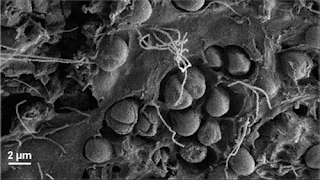 |
| Plastisphere, "Yum, Plastic" (Environmental Science and Technology), Grist |
***
In a recent post, I offered information about The Great Pacific Garbage Patch. Here's some more information about plastics in the ocean and on land; and, for extra measure, something about biomimetic materials.My search started with a Gizmag article, The hungry little bacterium that could hold the key to the world's plastic waste problem. Other, land-based eaters of plastic have been identified: fungus, mushrooms, worms, ... Apparently a lot of biota like plastic.
In a more measured tone, though, plastic-eating and water-based biota are changing the character of plastic present in the ocean in unpredictable ways. A study by Woods Hole proposes a whole new ecosystem. Larger plastic items are being converted to plastic confetti, causing the Garbage Patch to sink and become more bio-available: A 'little world' eating ocean garbage might be a mixed blessing.
Meanwhile humankind continues to probe the natural world for solutions. Here are some that have been identified: Six ways bio-inspired design is reshaping the future. My favorite is slide 3--Health: Battling Bacteria with Biomimicry--which mimics the design of shark skin. As the slide says:
Sharklet has created a bacteria-free surface that can be used in hospitals, restaurants, and other places where contamination has consequences. What's more, because this technique doesn't kill bacteria it will be far more difficult for them to evolve a resistance to it, sidestepping the core problem with most attempts at rendering bacteria harmless. After all, the root technology underwent a 400-million-year incubation period in the ocean, and bacteria haven't figured out how to thwart it yet.
BTW, I came across this page while searching: Degruyter's Bioinspired Materials.
Bioinspired Materials is an innovative journal devoted to publish constructive peer-reviewed, open access, cutting-edge articles from a wide range of research fields that use inspiration from Nature for the design of artificial materials for several scopes.
If you think just forgetting about plastic, which is based on oil anyway, and finding substitutes is a better idea, take a look at these 10 suggestions for eco-friendly plastics.
-- Marge

No comments:
Post a Comment